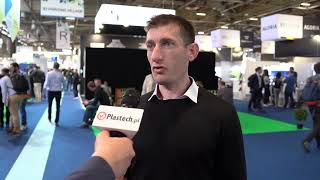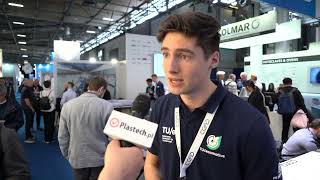In-situ polymerisation and injection moulding combined
As an injection moulding machine manufacturer with a very high degree of automation and system solutions expertise, Engel understands the key success factors that support the cost-effective production of fibre-reinforced plastic composites in large quantities. This ultimately led to the establishment of the Centre for Lightweight Composite Technologies. Current development projects cover a great many areas, from the processing of thermoplastic semi-finished products (thermoplastic fabrics and tapes) and thermoset compression moulding materials such as SMC to reactive technologies using thermoset and thermoplastic systems such as HP-RTM and the in-situ polymerisation of ε-Caprolactam.At its stand (hall 5A, stand P49), Engel will use components and videos to illustrate the latest position on all of these topics while offering insights into future processing possibilities and market prospects.
Of particular interest this year is the field of reactive technology. For the first time, Engel has worked with its partners to implement an integrated and highly automated process for the in-situ polymerisation of ε-Caprolactam to form composite carrier structures which are then functionalised via injection moulding. This represents a major milestone on the road to series production. Representing the wide range of possible applications, the first pre-series in-situ multi-component process has been designed for the production of lightweight shovels. "We believe in-situ polymerisation has a great deal of potential, both in the production of technical composite parts and the area of automotive lightweight construction," says Egger.
An Engel v-duo vertical machine with two differently temperature-controlled moulds, built by Schöfer, Schwertberg, Austria, will be used to produce the shovels. One cavity was set up for the reactive process and the other handled the injection moulding process. Dry, pre-shaped reinforcing fabrics are inserted into the first cavity and infiltrated with the reactive matrix. To do this, the solid ε-Caprolactam is melted and metered in the reactive unit. Thanks to the monomer's low viscosity in the molten state, the dry fibres can be wetted particularly well. A highly resilient composite is thus formed when polymerising to polyamide 6. Since reactive processing takes place below the polymer's melting temperature, the composite semi-finished product can be transferred to the second cavity immediately after it was produced where it is functionalised by injection moulding. Reinforcing ribs and contours of short glass fibre-reinforced PA 6 are injected to achieve this. Polymerisation and injection moulding take place parallel to each other.
Since the presentation of the first prototype machine, Engel has continuously optimised the system components and developed a completely new reactive unit that can be combined with different types of Engel machines. Engel was the first supplier on the market to melt and process solid monomers according to need. The advantages of this are significantly reduced thermal load, and therefore higher product quality.
With its v-duo series, Engel has developed a relatively compact, energy-efficient machine specifically for fibre composite applications, and one which facilitates particularly cost-effective production solutions. Its vertical clamping unit can be accessed from all four sides instead of just two.

Expanded possibilities at the Centre for Lightweight Composite Technologies
The St. Valentin site is also home to Engel's large-scale machine manufacturing plant, where machines in the duo, e-duo and v-duo series are built. As part of ongoing site expansion work, more space will be created at the Centre for Lightweight Composite Technologies. "We now have more capacity for development work and customer trials," says Peter Egger. Alongside an v-duo 700, a second, even larger v-duo with clamping force of 17,000 kN has been put into operation. To facilitate a very wide range of applications and technologies it is equipped for traditional injection moulding and reactive process technology, fitted with an Engel easix multi-axis robot and may be combined with the IR oven developed by Engel. The systems of the neighbouring technical centre for large-scale machines are also available to the lightweight construction experts of Engel for (mould) trials on horizontal systems.Engel at JEC world 2017: Hall 5A, atand P49 and at the Bond-Laminates stand: Hall 5A, stand J11




